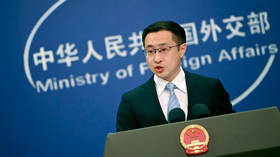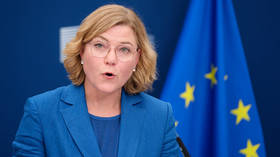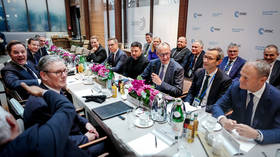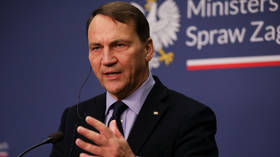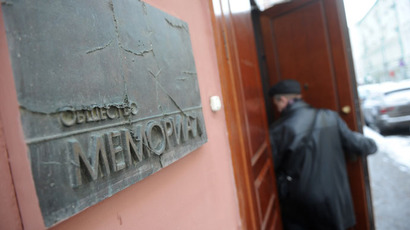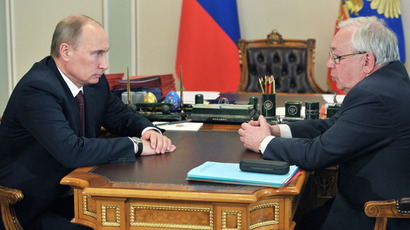Putin: No plans to close NGOs, public has right to know
Recent checks in Russian NGOs are completely in line with the law and have the sole objective of informing the Russian public on these groups’ activities, according to President Vladimir Putin.
In an interview with the German broadcaster ARD, Putin said that the recently-approved law on foreign agents that caused the major NGO audit had parallels in international practice. He also noted the extremely disproportionate representation of non-governmental presence from foreign countries in Russia.
Full transcript of the interview.
In the very beginning of the interview, the Russian President noted that it was not the objective of the NGO inspections to scare the public or the activists, adding that the mass media was performing that function.
Putin added that the real situation differed greatly from what was presented by the Western mass media. In particular, the fresh Russian law demanding that non-government organizations engaged in Russia's internal political processes and sponsored from abroad must be registered as foreign agents was noting new. The United States has had a very similar law since 1938.
Putin noted that the US law is enforced by the Department of Justice. All groups operating in the US must regularly submit information about their activities and this information is then reviewed by the counterespionage section.
The German reporter admitted he was not aware of such practices in the United States.
Putin went on to point out that there were 654 foreign-funded groups operating in Russia, while Russia sponsored only two foreign NGOs – one in France and one in the United States.
He also disclosed that foreign diplomatic missions transferred $1 billion. Eight hundred and fifty-five million was to the accounts of Russian-based NGOs in just the four months that passed since the approval of the Foreign Agents Law.
Putin told the interviewer that in his view, Russian society had the full right to know about the extensive network of foreign-sponsored organizations operating in the country, as well as about the amount of funding these groups were getting from their foreign sponsors.
The Russian leader then again stressed that the Russian authorities did not intend to pressure or shut down any organizations.
“We only ask them to admit: ‘Yes, we are engaged in political activities, and we are funded from abroad,’” Putin said. “The public has the right to know this.”
Putin also emphasized in his interview that the Russian authorities fully supported political competition, as without it the development of the country and the people is impossible. He said that the opposition had every right to protest, but even during these protests the rally-goers must abide by the law.
“There must be order. It is a well-known rule. It is universal and applicable in any country,” he stated, noting that the recent events in North Africa were a vivid example of what might happen if this principle is neglected.
The president recalled the recent changes in the law on political parties that drastically simplified both the registration and the work of these organizations. He also spoke of as other moves to liberalize the political system, such as the return of the gubernatorial elections, saying that this was proof that he and his supporters encouraged political competition.
'Feeling the Cyprus pinch'
When asked about the scope of Russian investment in Cyprus,
Putin said it was “absurd” to view private Russian business
interests operating in an EU country as having any connection with
the activities of the Russian government itself.
He did, however, state that following the $13 billion bailout
agreement with Cyprus, which included a one-time tax on deposits
held in Cypriot banks, foreign investors feeling the pinch in the
EU were more likely to “come to our financial institutions and
keep their money in our banks.”
Reacting to claims that Cyprus was a safe haven for dirty money,
Putin stressed that Russia neither created the offshore zone, nor
had anyone provided evidence of financial misconduct on the
Mediterranean island. But while no criminal wrongdoing has been
proven, people who had merely deposited their money without
breaking any laws now risk forfeiting 60 percent of their deposits
as a result of the Cyprus bailout deal.
The Russian president continued that apart from Cyprus, other zones
had been created by the European Union, and it was a red herring to
place the blame for illicit activities on investors who benefited
from them.
“If you consider such zones a bad thing, then close them.
Why do you shift responsibility for all problems that have arisen
in Cyprus to investors irrespective of their nationality (British,
Russian, French or whatever else).”
When asked if he had felt snubbed by the EU when it opted not to
turn to Russia for help despite the number of Russian nationals
affected, Putin resolutely answered no.
“On the contrary I am even glad, to some extent, because the
events have shown how risky and insecure investments in Western
financial institutions can be.”
‘We trust the Euro’
Despite previous criticism of certain aspects of the European
financial system, Putin stated emphatically that “we trust the
euro.”
Putin was unwilling to comment in depth on the internal workings
of the EU that had no direct bearing on Russia, as it would be
disrespectful to EU leaders.
He did say, however, that despite several points of contention
between the EU and Russia, they “are fundamentally moving in the
right direction” and Russia had made the right decision in
keeping such a large share of its gold and currency reserves “in
the European currency.”
Reiterating Russia’s trust in the economic policy of major
European countries, Putin remains confident that Europe will
overcome the difficulties it is currently facing.



